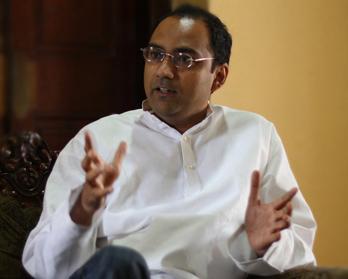 Cochin-born and raised Shaffi Mather, founder of an ambulance service that has revolutionized medical transport in Mumbai and Kerala, was appreciative of President Obama's "vision of trying to bring together grassroots and community-based entrepreneurs, instead of the regular Fortune 500 and Forbes businessmen."
Cochin-born and raised Shaffi Mather, founder of an ambulance service that has revolutionized medical transport in Mumbai and Kerala, was appreciative of President Obama's "vision of trying to bring together grassroots and community-based entrepreneurs, instead of the regular Fortune 500 and Forbes businessmen."
"It was an incredible set of people from around the world doing amazing work, who were invited," said Mather, 41, who lived and worked in the United States for nearly two decades before returning to India to start his venture with four friends, who had also returned from the US.
Mather, who has three master's degrees from the US -- in finance, business and public policy from the University of Connecticut, University of Pittsburgh and Harvard University, respectively, said he participated in "all the panels and it was amazing listening to each other's experiences -- it was inspiring and I am hoping that they continue this and create this as a platform for a much larger community of social entrepreneurs to interact."
"My takeaway from the summit is that he (Obama) is making a concerted effort not only to the Muslim community, but the developing countries, the least developed countries, saying America under his administration is not going to be the Big Brother. They want to interact as partners," he said.
"There were hardly any speeches. It was all interactive panel discussions. So, there was a lot of emphasis on listening as much as they (senior US officials) were willing to talk."
Mather acknowledged that by convening a summit for entrepreneurs from largely Muslim majority countries and nations with sizable Muslim minorities, Obama was being "bold".
"But Obama has been radical and a grass-roots man during his Chicago days," he said. "The other aspect to look at is that when you want to repair a damaged relationship, you have to go that extra mile which obviously has to be commensurate with the damage done in the past. For all the damage that has been done in the past, this is one step forward. I don't think this is enough. They have to do much more."
Mather said the idea behind his 1298 ambulance service had nothing to do "with healthcare", but all to do with "a few incidents and close friends who sustained near-death experiences and losing a dear friend in a road accident."
"We didn't start off to launch an ambulance service," he said. "We thought we would study it and present it to the political and bureaucratic leadership. The insensitivity of the leadership we met motivated us to put together a little bit of money and buy one ambulance and start out in 2004."
Mather said it was essentially a 911 service and used the same US and United Kingdom ambulance template of "same quality service in terms of ambulances. The control room uses the latest technology."
The service, which is for-profit, has a sliding scale of payment, where the "rich pay higher, the poor pay lower and absolute poor get the service free."
Initially, Mather said, all callers claimed to be poor. They tackled this by charging those taken to private hospitals a higher fee and those taken to public hospitals a lower fee or free service. "Roughly 26 percent of the transports we do are subsidized or free," he said.
The service has now grown to 51 ambulances 31 in Mumbai, 13 in Kerala, and the rest in Patna.
Image: Shaffi Mather









